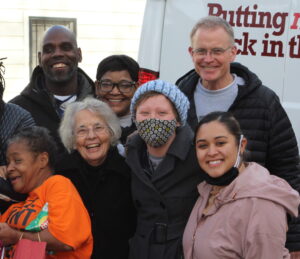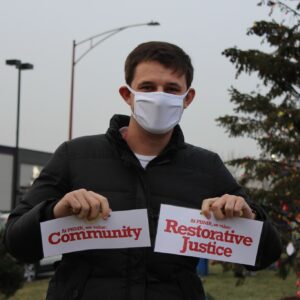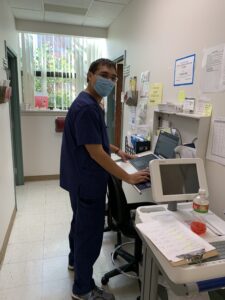Rolling Up Our Sleeves

Current PBV, Raechel Kiesel (masked), with other members of the PBMR community
In early November I attended the Ignatian Family Teach-in For Justice, which is hosted by the Ignatian Solidarity Network. One of the speakers, Father Greg Boyle, S.J., founder of Homeboy Industries, a gang intervention program in Los Angeles, spoke about our call to practice kinship. In his talk he kept coming back to a note that we all share the same last name. The last name “being.” He continued, “we are all born the same way. Everyone is unshakably good. Everyone belongs to each other.”
The message from Father Greg has been echoing in my prayers and my mind over the last few weeks. We all belong to each other. We are all in God’s family. We are all made in the image and likeness of God, and we are “unshakably good.” This is all true, but do we actually believe it?
Sometimes it’s hard to see that in the middle of a growing catastrophe of human-caused global climate change, violence that tears the fabric of our communities, the northern hemispheric (and largely white-centric) economic system that leaves billions of folks behind because of where they were born or the color of their skin, and so many other evils in our world.
As I was lost in the despair of so much that is wrong in the world, I kept coming back to his encouragement that we are about “obliterating the illusion that we are separate, we are human beings.” His further instruction that we should not “settle for just shaking your fist, roll up your sleeves to create the place where we cherish each other with every breath.” The challenge is to live up to the belief that we are all connected and then point the way to God’s inclusive love.

Current PBV, Vincent Tedford, in Chicago
When I meet with our volunteers, I see them rolling up their sleeves and being part of creating places where all people are cherished. They are in places where they are better able to recognize their family members who share the same last name of “being” and are children of our loving Creator. I am amazed when I talk to them about what they see and experience with the folks they work and walk with. Instead of just shaking their fists they continue to do the hard work of building a better and more just world. They choose to live out a spirituality of the blood, a spirituality Father Robert Schreiter, C.PP.S. described as a spirituality that “proclaims life in a world where death seems to have the upper hand.”
On a daily basis our volunteers witness the toll that structures which uphold white supremacy and racism takes on the folks they walk with in their placements. It would be easy for our volunteers to point out and shake their fists at these injustices. I know I find myself often shaking my fists at these injustices, and not pointing the way to life. Oftentimes most of us take the easy path of ignoring our own participation in these systems. The hard work of rolling up our sleeves requires us to take a good hard look at our own participation in these structures and commit to breaking them down and building up places where all people are cherished.
We are continuing on with our commitment to the charism of the Precious Blood by making sure we are a welcoming and inclusive community that reflects our charism of reconciliation. Over the next few months we are expanding an effort to examine how the Precious Blood Volunteers Program can proclaim life in this world through being a more racially just program and working for the liberation of all God’s people.

Current PBV, Aaron Wise, at work at KC CARE Health Center
This process will include making sure we are a welcoming and inclusive community that reflects our charism of reconciliation and renewal. It requires some deep questions about how we support our volunteers and alumni of color. In this process we will be looking at how our recruiting practices may unnecessarily exclude people of color. This includes examining how we portray our volunteers and the people they serve in our brochures and website, as well as how we talk about our ministry at recruiting fairs and from where we recruit our volunteers.
We are looking beyond just our own practices to challenge our volunteers and placements to be pointing towards this way of being together as one family. We will engage with our placements to make sure they are working towards a more just future in their hiring practices, their support of their staff, how they treat the people they serve, and who is leading their organizations. We want to be sure that our volunteers are working for reconciliation, where the lives of the folks they work and walk with are valued. Our volunteers should be using this year as an opportunity to bind up their own liberation with the liberation of the people they work with.
In our discernment process and throughout their volunteer year we will need to see how we can better help our volunteers discern their purpose as a way to glorify God through their work and relationships with others.
You can watch Father Boyle’s talk at https://www.youtube.com/user/IgnatianSolidarity along with other videos from the 2021 Ignatian Family Teach-In for Justice.
Tim Deveney is director of Precious Blood Volunteers. You can learn more about Precious Blood Volunteers at preciousbloodvolunteers.org.
